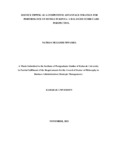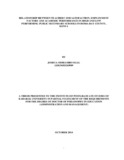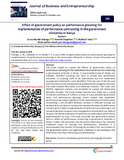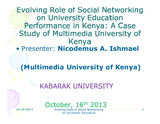| dc.description.abstract | Attainment of competitive advantage is an ultimate goal of any organization. Further,
the hotel industry remains extremely competitive world over; not to mention its
significance as a major foreign exchange earner in Kenya. In view of this, many hotels
have adopted a variety of strategies to keep their customers happy which has been
found to be contingent upon a happy workforce. Service tipping historically has taken
many forms including voluntary tips by customers and systematic service charge or
gratuity to appreciate hotel staff for their service. The question of whether to formalize
this practice and develop formal system or best practices for it as a strategy in the hotel
industry in Kenya has not received scholarly attention especially on its influence to
hotel performance yet it is casually very rampant. This study therefore, aimed at
determining the effect of Service Tipping as a competitive advantage strategy on
performance of hotels in Kenya using the Balanced Score Card four main performance
indicator perspectives namely financial, customer, internal business processes and
learning and growth. The four perspectives formed specific evaluation criteria on
indicators for performance to the model analysis against the independent variable of
service tipping in different characteristics and moderated by the hotel rating. A part
from empirical literature, the theories used in the study include Resource Dependency
Policy, Reciprocity and Equity Theory, Tipping Motives Framework (TMF) and
Balanced Scorecard Framework. The study adopted a mixed method including
descriptive survey and predictive correlation research designs targeting 183 star rated
hotels in Kenya. The study used a sampling formula by Yamane (1967) to arrive at a
sample size of n=126 of the star rated hotels in Kenya obtained from the Ministry of
Tourism and Wildlife classification. Data collection was mainly done through physical
dropping of the questionnaires by research assistants to hotels around towns and by
mail especially to those hotels that were inaccessible either in towns or away from
towns. The study was conducted in a period of three months using structured
questionnaires. The study used drop and pick procedure for data collection for the
required data. Due to wide distribution of Tourism Circuits where hotels are located in
Kenya, some of the questionnaires were mailed to the respondents. The study used
descriptive statistics such as means, standard deviation and percentages and inferential
statistics using Regression Analysis. The study established that service tipping affected
financial, customers satisfaction, internal business process, and learning and growth
performance of hotels in Kenya. The study established that when star rating was
introduced as a moderating variable, the relationship between service tipping and hotels
performance remained statistically significant, although the value of the regression
coefficient reduced slightly (r=1.089-1.088 = 0.001). This slight change in the
coefficient is the statistical proof that when star rating was introduced, it slightly
reduced the regression coefficient although the relationship between service tipping and
hotels performance remained statistically significant. The study recommends that
Tourism Regulatory Authority which is the policy body of Hotels in Kenya should
develop Service Tipping Policy to guide in service operations in the Star Rated Hotels
in Kenya to further improve the Star Rated Hotels performance since the study
established that service tipping positively affected Balanced Score Card performance
indicators of the hotels. | en_US |




